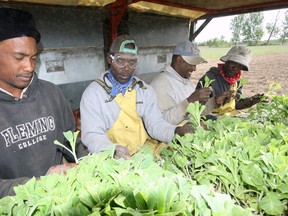Jack Frost's icy caress

Article content
Jack Frost’s unwelcome, icy caress fell across the area early Monday morning.
“It’s farming,” shrugged tobacco producer Dennis Verbruggen of Dengrow Inc., as he trailed a two-row planter, trowel and plants in hand, Monday morning in a field along Potters Road.
“There’s something wrong with this picture,” he laughed, kept busy keeping a steady flow of trays to planters Kevle Chin, Everton Morrison, Lennon Witten and Linval Smith, and filling in any ‘misses’.
“Enough (miles a day),” he responded. “Especially this week, it’s going to be early mornings and late nights.”
Verbruggen began planting a 105-acre crop last Monday, but ceased operations with 12 acres in around 2 p.m. Tuesday, based on a weather forecast including the chance of frost. Temperatures dipped close to the freezing mark overnight Friday and Saturday. Sunday evening’s preliminary forecasts seemed to indicate the immediate threat of frost had passed, but that prognosis changed.
Nellie Verbruggen said one forecast for Tillsonburg was for plus six overnight, but alternate forecasts from suggested temperatures might fall to plus one. Dennis had resumed planting Sunday, but quit around 10:30 a.m. based on the ongoing frost threat.
Nellie was up at around 4:30 a.m. Monday, bringing potted plants indoors upon the advice of husband Rick.
“Last night was the worst,” said Dennis. “The few (nights) before were close, but last night was the killer.”
Preliminary indications are some damage was done to around three acres of Dengrow Inc. tobacco planted Sunday, although not that in the ground planted earlier in the week. Fresh planting seems more susceptible to frost, said Nellie, possibly because absorbed daytime heat is retained better in undisturbed ground.
“It was not helpful,” said Nellie. “It seems like it’s one thing after another,” she added. “But Mother Nature is one thing you can’t do anything about.”
Many area tobacco farmers had put planting on hold, although Dennis says, he has heard by word-of-mouth that one producer had 60 acres in.
“Some guys stopped, some kept going.”
Based on a more favourable long-term forecast, he and his six-man field crew were back in the field Monday, striking the balance between dodging frost, and getting a 100-acre-plus crop in the ground.
A small amount of replanting aside, Verbruggen is roughly a week behind where he was a year ago, but far from in panic mode, based on the length of the growing season.
“A lot can change between now and August.”
Hopefully, forecast warmer temperatures will not change, says the Tillsonburg-area producer. Given the overall provincial acreage, plants are valuable commodities.
“There’s not enough to do it twice,” Verbruggen concluded.
Provincial Cereal Speciallist with the Ontario Ministry of Agriculture and Food (OMAF) Peter Johnson says there was frost across the province, and while it didn’t appear to be a total disaster, only time will tell on its overall damage.
“We need to wait a day or two to see how bad it is.”
The great majority of corn is relatively safe at this point of the growing season, says Johnson, based on the fact, even if its above-ground component is damaged, there is enough under-ground resilience to not only survive, but sustain yields.
“The corn, almost for sure, will push through and be OK.”
Soybeans are more frost resistant than corn at this point, he continued, able to tolerate minus two-point-four degrees Celsius for up to four hours.
“It was sunny and warmed up quickly this morning, so it froze for an hour or less in most cases.”
Some early wheat in Essex County may have been at the vulnerable pollination stage, says Johnson, where temperatures of minus one degree Celsius for even an hour can damage the pollen grain. The canopy in a field of wheat is hoped to provide more protection, than say a tomato plant in an open field, but he is concerned there may have been some damage.
“It’s too early to tell at this point.”
Although qualifying he was speaking outside his area of expertise, Johnson said he believed apple trees were past the blooming stage, and as a result, should not be catastrophically damaged as they were in 2012. He was more concerned about crops including tomatoes, strawberries (particularly susceptible at the blooming stage), tobacco and asparagus.
Brenda Lammens of Spearit Farms south of Tillsonburg, says their asparagus crop does not seem to have been affected.
“There was frost around,” she said. “But it doesn’t seem to have hurt the asparagus.”
She, was caught somewhat offguard by changing weather forecasts, and a temperature gauge in the plus readings at 6 a.m. which argued against the presence of frost which was undeniably there.
“They made it seem like Saturday night was the danger, but last night seemed to be the culprit.”
Asparagus prefers warmer temperatures, and Lammens welcomes the current forecast for higher, ongoing temperatures. Cooler weather does curtail production, she said, but on the plus side, through 2013, “we have a good-quality product.”